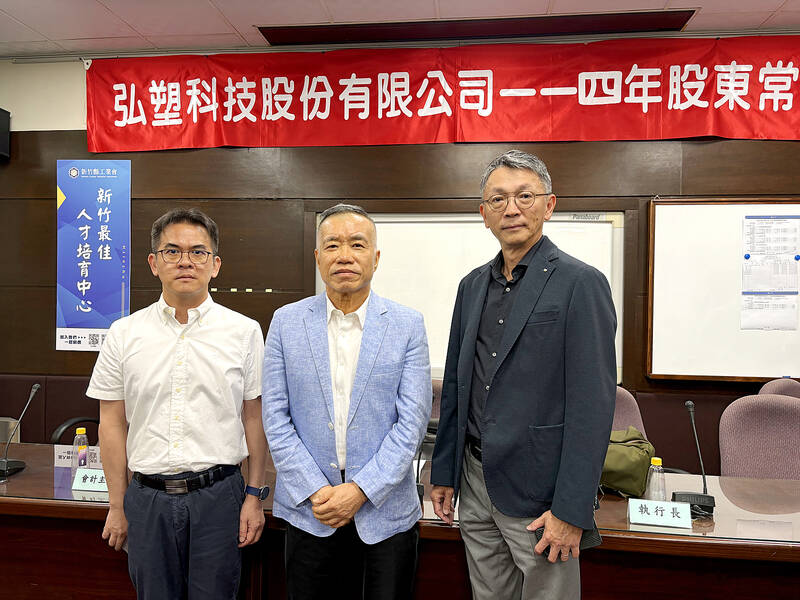Grand Process Technology Corp (GPTC, 弘塑科技), an advanced chip packaging equipment supplier, yesterday gave a bullish outlook for this year, saying it expects revenue to grow to a record high thanks to increasing customer demand amid new capacity expansion plans.
GPTC supplies a wide range of semiconductor wet processing equipment used in advanced chip-on-wafer-on-substrate (CoWoS) packaging technology, including wet benches, wet cleaning and single wafer set processing systems.
GPTC counts Taiwan Semiconductor Manufacturing Co (TSMC, 台積電) and ASE Technology Holding Co (日月光投控) among its major customers.

Photo: Lisa Wang, Taipei Times
TSMC has been expanding CoWoS capacity to satisfy the surging demand for Nvidia Corp’s artificial intelligence (AI) chips, while ASE expanded capacity aggressively this year, because of the AI boom.
“The company has been digesting order backlogs since the second half of last year. We are working around the clock to solve this issue. Revenue this year will certainly grow [over last year],” GPTC chairman Hoton Chang (張鴻泰) said yesterday. “We are optimistic about the full-year business prospects. The second half will be a better period than the first.”
Cumulative revenue soared 51.1 percent year-on-year to NT$2.32 billion (US$78.3 million) during the first five months of this year, after last month’s figure hit a record NT$522 million.
In terms of equipment shipments, GPTC expects to see an annual expansion of more than 10 percent, company president Jao Huang (黃富源) said.
“We are currently discussing new order arrangements with customers. Overall, we are quite positive about ordering, despite US-China trade policies weighing on the external environment,” Huang said.
To cope with strong customer demand, the company plans to double its wet processing equipment capacity this year, GPTC said on the sidelines of the company’s annual general meeting in Hsinchu County’s Jhubei City (竹北).
GPTC also said it plans to issue new convertible bonds to fund new investments or merger-and-acquisition deals.
To hedge foreign exchange risks, the company is trying to lower its US dollar-denominated assets by encouraging overseas customers to make payments in New Taiwan dollar, yuan or euro, it said.
The new mechanism, which took effect last month, would cut the company’s revenue in US dollar terms from 30 percent to about 10 percent, the company said.
In addition, the company has cut its US-dollar cash position from as high as US$40 million to about US$7 million by converting a large portion of its cash into NT dollars, it said.
Most local companies are facing challenges given the volatility of foreign exchange rates, with the NT dollar appreciating about 10 percent since April, GPTC said.
Shareholders yesterday approved the distribution of a cash dividend of NT$22 per common share. That represented a payout ratio of 75.68 percent based on the company’s earnings per share of NT$29.07 last year.

Taiwan’s foreign exchange reserves hit a record high at the end of last month, surpassing the US$600 billion mark for the first time, the central bank said yesterday. Last month, the country’s foreign exchange reserves rose US$5.51 billion from a month earlier to reach US$602.94 billion due to an increase in returns from the central bank’s portfolio management, the movement of other foreign currencies in the portfolio against the US dollar and the bank’s efforts to smooth the volatility of the New Taiwan dollar. Department of Foreign Exchange Director-General Eugene Tsai (蔡炯民)said a rate cut cycle launched by the US Federal Reserve

Handset camera lens maker Largan Precision Co (大立光) on Sunday reported a 6.71 percent year-on-year decline in revenue for the third quarter, despite revenue last month hitting the highest level in 11 months. Third-quarter revenue was NT$17.68 billion (US$581.2 million), compared with NT$18.95 billion a year earlier, the company said in a statement. The figure was in line with Yuanta Securities Investment Consulting Co’s (元大投顧) forecast of NT$17.9 billion, but missed the market consensus estimate of NT$18.97 billion. The third-quarter revenue was a 51.44 percent increase from NT$11.67 billion in the second quarter, as the quarter is usually the peak

The US government on Wednesday sanctioned more than two dozen companies in China, Turkey and the United Arab Emirates, including offshoots of a US chip firm, accusing the businesses of providing illicit support to Iran’s military or proxies. The US Department of Commerce included two subsidiaries of US-based chip distributor Arrow Electronics Inc (艾睿電子) on its so-called entity list published on the federal register for facilitating purchases by Iran’s proxies of US tech. Arrow spokesman John Hourigan said that the subsidiaries have been operating in full compliance with US export control regulations and his company is discussing with the US Bureau of

Pegatron Corp (和碩), a key assembler of Apple Inc’s iPhones, on Thursday reported a 12.3 percent year-on-year decline in revenue for last quarter to NT$257.86 billion (US$8.44 billion), but it expects revenue to improve in the second half on traditional holiday demand. The fourth quarter is usually the peak season for its communications products, a company official said on condition of anonymity. As Apple released its new iPhone 17 series early last month, sales in the communications segment rose sequentially last month, the official said. Shipments to Apple have been stable and in line with earlier expectations, they said. Pegatron shipped 2.4 million notebook